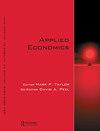Do employment opportunities decrease for older workers?
IF 1.8
3区 经济学
Q2 ECONOMICS
引用次数: 3
Abstract
ABSTRACT Increasing the labour market participation rates of older workers is a means to secure the sustainability of public finances. However, questions about the effects of job loss of unemployed older workers and their employment prospects remain. This paper investigates why workers, aged 50 and over, have less employment opportunities. Using a competing risks model on British panel data, we examine the chances of re-employment after unemployment spells for older individuals. We find that human capital characteristics and economic incentives play an important role in their chances of getting back to work. We show that the probability of returning to employment after an unemployment spell decreases as workers get older. A decomposition analysis supports the role of age in the unemployment duration gap between ‘older’ and ‘younger’ individuals. The duration of leaving unemployment to employment of older workers would be lower if they will be treated in the same way as the younger ones, which is consistent with elderly employment barriers.老年员工的就业机会减少了吗?
提高老年工人的劳动力市场参与率是确保公共财政可持续性的一种手段。然而,关于失业对老年失业工人的影响及其就业前景的问题仍然存在。本文调查了50岁及以上的工人就业机会较少的原因。利用英国面板数据的竞争风险模型,我们研究了老年人失业后再就业的机会。我们发现,人力资本特征和经济激励在他们重返工作岗位的机会中起着重要作用。我们表明,失业后重返工作岗位的可能性随着工人年龄的增长而降低。一项分解分析支持了年龄在“老年人”和“年轻人”失业持续时间差距中的作用。如果给予老年劳动者与年轻劳动者相同的待遇,老年劳动者从失业到就业的持续时间就会缩短,这与老年人就业障碍是一致的。
本文章由计算机程序翻译,如有差异,请以英文原文为准。
求助全文
约1分钟内获得全文
求助全文
来源期刊

Applied Economics
ECONOMICS-
CiteScore
3.80
自引率
4.50%
发文量
525
期刊介绍:
Applied Economics is a peer-reviewed journal encouraging the application of economic analysis to specific problems in both the public and private sectors. It particularly fosters quantitative studies, the results of which are of use in the practical field, and thus helps to bring economic theory nearer to reality. Contributions which make use of the methods of mathematics, statistics and operations research will be welcomed, provided the conclusions are factual and properly explained.
 求助内容:
求助内容: 应助结果提醒方式:
应助结果提醒方式:


